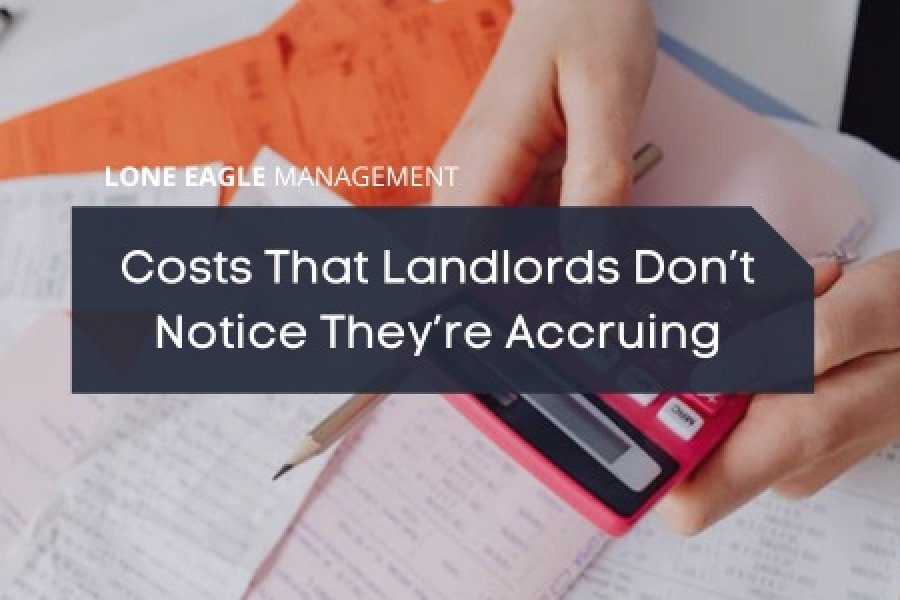
- Vacancy and Underpricing Reduce Profits: Vacancies and underpriced rent are two of the biggest profit killers for landlords and often go unnoticed.
- Legal Mistakes and Poor Collection Hurt Cash Flow: Legal oversights and inefficient rent collection can result in serious financial and compliance issues.
- Property Managers Help Maximize Returns: Partnering with a property manager helps identify and eliminate hidden costs while protecting your investment.
Owning rental property is widely viewed as a dependable way to build long-term wealth, but many landlords are surprised to find their profits falling short.
Often, the gap is due to unnoticed expenses caused by inefficiencies, maintenance problems, or outdated practices. These costs can quietly erode your bottom line if left unaddressed.
At Lone Eagle Management, we know that understanding what these silent expenses are and learning how to address them is essential for keeping your rental property profitable. Below is a list of what every landlord should watch out for.
Learn How We Can Help You Maximize Your Home’s Potential!
1. Prolonged Vacancy Periods
One of the most significant yet underestimated costs is vacancy. Mortgage payments, property taxes, insurance, and utility bills don’t pause just because the unit is unoccupied.
Landlords sometimes delay finding a new tenant due to a busy schedule or because they want to avoid the hassle of marketing their property listing. Others may price their units too high for the area, leading to long gaps between residents.
These delays result in cumulative losses that can be hard to recover from. To avoid this, landlords must proactively plan for turnovers, advertise promptly, and price their rentals competitively based on the current market.
2. Underpricing the Rental
Just as vacancy leads to losses, underpricing your rental can quietly drain income over time. Some landlords stick with the same rental rate for years, either out of habit or to avoid conflict with tenants. However, this can cause you to miss out on thousands of dollars annually.

Rental prices fluctuate with the market, and failing to adjust accordingly puts your income below its potential. Even a small increase, say $50 per month, results in $600 more per year per unit. When you have multiple properties, the difference adds up significantly.
Regularly reviewing market trends and rental rates in your area ensures you’re not leaving money on the table.
3. Frequent Turnover and Resident Damage
Another subtle cost comes from high turnover. When residents move out frequently, landlords face costs associated with cleaning, repainting, minor repairs, and advertising. Add to this the vacancy time between tenants, and the total price of turnover can be steep.
While some turnover is expected, frequent resident changeovers may signal deeper issues, such as poor communication, delayed maintenance, or misaligned expectations. Additionally, tenants who don’t take care of the property can cause excessive wear and tear, leading to expensive repairs.
Good tenant screening and maintaining a strong landlord-resident relationship can reduce turnover and damage-related expenses.
Learn More About Lone Eagle Management!
4. Deferred Maintenance
Postponing maintenance might feel like a cost-saving decision in the short term, but it often leads to bigger expenses down the road. A small roof leak left unchecked can result in structural damage, mold problems, or electrical issues.
Neglecting regular property inspections and preventive maintenance may lead to a backlog of repairs and a degraded living experience for tenants. In the long run, this contributes to resident dissatisfaction and high turnover, which are costly to resolve.
Creating a maintenance schedule and responding quickly to repair requests keeps your property in good shape and minimizes future expenses.

5. Legal Issues and Noncompliance
Legal mistakes are among the most expensive oversights landlords can make. Issues like outdated leases, mishandled deposits, or noncompliance with local codes can lead to costly fines or legal disputes.
Because laws vary and change frequently, it’s essential to stay informed, keep accurate records, and seek legal guidance when needed to avoid serious financial consequences.
6. Inefficient Rent Collection
Late rent payments and inconsistent collection methods can cause cash flow issues. Landlords who accept rent in cash or checks may experience delays, errors, or even losses due to misplaced payments. Some may not have a process in place for dealing with late payments or enforcing lease terms.
Streamlining rent collection with online payment platforms not only improves consistency but also helps you keep better records. Implementing late fees and having a clear rent collection policy helps reduce missed payments and encourages timely transactions.
Reach Out to Our Team!
7. Poor Utility Management
In cases where landlords cover utilities, inefficient usage or outdated systems can result in excessive monthly bills. Older plumbing, appliances, or heating systems can consume more energy or water than necessary, leading to high utility costs.
Even if tenants pay their utilities, poor insulation or drafty windows can result in complaints or lower satisfaction, prompting early lease terminations. These issues can often be addressed with energy-efficient upgrades that reduce utility costs and improve resident comfort.
Periodic energy audits and modest investments in upgrades can create long-term savings and attract more tenants.
Why You Should Work with a Property Management Company
One of the most effective ways to reduce these unnoticed costs is to partner with a professional property management company. While it might seem like an added expense, property managers often save landlords more than they cost.

A good property manager ensures shorter vacancy periods through effective marketing and competitive pricing. They have systems in place for rent collection, lease enforcement, and maintenance coordination. They also stay current with local laws, helping landlords avoid legal trouble and compliance errors.
In addition, property managers can conduct regular inspections, vet tenants thoroughly, and respond quickly to service requests. These practices prevent small issues from escalating and keep turnover low.
Most importantly, working with a management company allows landlords to reclaim their time and reduce stress, making real estate investment truly passive.
Discover Our Property Maintenance Services!
Bottom Line
Hidden costs can quietly eat away at your rental income, whether it’s prolonged vacancies, underpriced rent, high turnover, deferred maintenance, legal missteps, or inefficient processes.
These expenses often go unnoticed until they’ve already made a significant dent in your profits. Staying on top of market trends, maintenance schedules, and compliance requirements takes time, effort, and expertise.
That’s where Lone Eagle Management can make a real difference. Our team helps landlords stay profitable by identifying and eliminating these silent expenses through proactive, hands-on property management.
When you work with Lone Eagle Management, you gain a trusted partner committed to protecting your investment and maximizing your return.